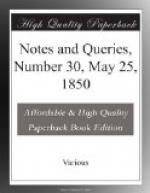As regards the derivation of “News,” I wish you had allowed the question to rest as it stood after the sensible remarks of “A.E.B.” (No. 23. p. 369.). Pray excuse me, Sir, for expressing a hope that you will ponder well before you again allow us to be puzzled on so plain a subject, and give circulation and your sanction to paradoxes, even though coming from one so entitled to attention as “Mr. HICKSON.”
The early communication between the English and German languages, of which “Mr. HICKSON” puts forward the derivation of “news” from “neues” as an instance, may be an interesting and profitable subject of inquiry; but as I think he has been singularly unfortunate in the one instance, so I do not think him particularly happy in his other. I see no further resemblance between Heywood’s “Song in praise of his Mistress,” and the early German poem, than what might arise from treatment of the same and a very common subject.
I am not enough of an etymologist to give you the root of the word “noise.” But my faith in “Mr. HICKSON” in this capacity is not strong enough to lead me to believe, on his dictum, that “news” and “noise” are the same word; and when, pursuing his fancy about “neues,” he goes on to say that “noise” is “from a dialect from which the modern German pronunciation of the dipthong is derived,” I fear his pronunciation of German is faulty, if he pronounces eu in “Neues” like oi in “noise.”
[We differ from our correspondent
on this point, and think that
here, at all events, Mr. HICKSON
has the advantage of the
argument.]
I beg to repeat that for “Mr. HICKSON” I feel great respect. If he knew my name, he would probably know nothing about me; but I happen {488} to know of him, what perhaps, some of your readers do not, that he has unostentatiously rendered many considerable services not only to literature but to our social and political interests. In my humble opinion, his recent essay in your columns on The Taming of the Shrew is a contribution to our literary history which you may be proud of having published. But I feel that I cannot too strongly protest against his derivation of “News.”




